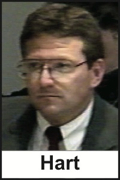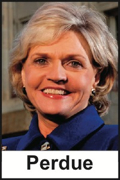Rascals case in brief
In the beginning, in 1989, more than 90 children at the Little Rascals Day Care Center in Edenton, North Carolina, accused a total of 20 adults with 429 instances of sexual abuse over a three-year period. It may have all begun with one parent’s complaint about punishment given her child.
Among the alleged perpetrators: the sheriff and mayor. But prosecutors would charge only Robin Byrum, Darlene Harris, Elizabeth “Betsy” Kelly, Robert “Bob” Kelly, Willard Scott Privott, Shelley Stone and Dawn Wilson – the Edenton 7.
Along with sodomy and beatings, allegations included a baby killed with a handgun, a child being hung upside down from a tree and being set on fire and countless other fantastic incidents involving spaceships, hot air balloons, pirate ships and trained sharks.
By the time prosecutors dropped the last charges in 1997, Little Rascals had become North Carolina’s longest and most costly criminal trial. Prosecutors kept defendants jailed in hopes at least one would turn against their supposed co-conspirators. Remarkably, none did. Another shameful record: Five defendants had to wait longer to face their accusers in court than anyone else in North Carolina history.
Between 1991 and 1997, Ofra Bikel produced three extraordinary episodes on the Little Rascals case for the PBS series “Frontline.” Although “Innocence Lost” did not deter prosecutors, it exposed their tactics and fostered nationwide skepticism and dismay.
With each passing year, the absurdity of the Little Rascals charges has become more obvious. But no admission of error has ever come from prosecutors, police, interviewers or parents. This site is devoted to the issues raised by this case.
On Facebook
Click for earlier Facebook posts archived on this site
Click to go to
Today’s random selection from the Little Rascals Day Care archives….
Click for earlier Facebook posts archived on this site
Click to go to
Today’s random selection from the Little Rascals Day Care archives….
‘Mindhunter’ series misguided in choice of role model

popsugar.com
Garcia
Oct. 19, 2017
“Though ‘Mindhunter’ at times seems like a fictitious nightmare, the new Netflix series is very much rooted in reality. Holden Ford (Jonathan Groff) is based on real-life FBI agent John E. Douglas, and Dr. Wendy Carr (played by Anna Torv) is based on Dr. Ann Wolbert Burgess, a pioneer in the treatment of trauma and abuse victims….
“The character molded after Burgess helps Ford and his partner legitimize their research with her sociological and science-backed knowledge….”
– From “The Influential Trailblazer Who Inspired Mindhunter’s Dr. Wendy Carr” by Kelsey Garcia at Popsugar (Oct. 16)
Yes, it’s just a TV character. But the depiction of Ann Wolbert Burgess as a trustworthy source of “science-based knowledge” should appall anyone who recalls her national prominence in igniting the “satanic ritual abuse” day care panic.
Most grievous for the Little Rascals defendants, it was Burgess who led a three-day conference in Kill Devil Hills just months before Bob Kelly’s arrest. The agenda: learning how to spot child molesters operating day-care facilities.
She has never apologized.
![]()
Bill Hart played by his own (poker) rules
 June 8, 2012
June 8, 2012
“The duty of the prosecutor is to seek justice, not merely to convict.”
– American Bar Association
“The primary responsibility of prosecution is to see that justice is accomplished.”
– National District Attorneys Association
“If you were playing poker, would you be playing with your full hand
showing?”
– Bill Hart, special deputy attorney general, defending his unwillingness
to share evidence with the Little Rascals defense
Therapists were naïve in use of dolls
 April 10, 2013
April 10, 2013
“Consider the use of anatomically detailed dolls to prompt shy or frightened children to reveal abuse. This was an innovation of the 1970s, and at first it certainly seemed like an effective and compassionate one.
“But more recent studies have cast doubt on whether these dolls prompt more accurate recall, especially for the pre-schoolage children for whom they are usually deployed.
“The doll is supposed to be a body double for the child him- or herself; but since the vast majority of children this age lack the symbolic thinking required to make such a connection– most two- and three-year-olds, for example, cannot see the relation between a room and a scale model of it – this proposition turns out to be rather dubious.
“More to the point, it seems that some children who have not been sexually abused will also play with an anatomically detailed doll in sexually suggestive ways – promptly removing its clothes, touching or grabbing its ‘genitals,’ sticking their fingers into various orifices. As the authors of one study judiciously put it, the ‘average amount of sexualized doll play by presumably non-abused children is not alarming, but there is enough of it to be potentially problematic in clinical or forensic situations.’
“In other words, if you are prepared to see signs of abuse, you may see them even in behavior that, in other contexts or at other times, would be attributed to normal sexual curiosity.
“And this is precisely the issue: At a time when there was comparatively little data available on what constituted normal sexuality in children, this vacuum was filled by people with a very narrow view of the possibilities.”
– From “Against Innocence: The truth about child abuse and the truth about children” by Margaret Talbot in The New Republic (March 15, 1999)
Prosecution therapists in the Little Rascals case made extensive use of anatomically correct dolls. During Bob Kelly’s trial, therapist Janet Hadler of Chapel Hill showed a video clip of a 5-year-old girl pressing together the pelvises of a male and a female doll. “Children who are demonstrating explicit sexual contact,” Hadler testified confidently, “are doing that because they have some knowledge of adult sexual behavior.”
Perdue removes one stain, leaves another
Jan. 2, 2013
What a bittersweet moment, reading Gov. Bev Perdue’s statement announcing her pardon of innocence for the Wilmington 10.
 Surely, for the six surviving defendants, the pardon represents far too little justice, far too long delayed. But so many of Perdue’s words apply poignantly to a more recent “dark chapter in North Carolina’s history” – the prosecution of the Edenton Seven:
Surely, for the six surviving defendants, the pardon represents far too little justice, far too long delayed. But so many of Perdue’s words apply poignantly to a more recent “dark chapter in North Carolina’s history” – the prosecution of the Edenton Seven:
“I have decided to grant these pardons because the more facts I have learned… the more appalled I have become about the manner in which their convictions were obtained….
“This conduct (of prosecutor Jay Stroud) is disgraceful. It is utterly incompatible with basic notions of fairness and with every ideal that North Carolina holds dear. The legitimacy of our criminal justice system hinges on it operating in a fair and equitable manner…. That did not happen here. Instead, these convictions… represent an ugly stain on North Carolina’s criminal justice system….
“Justice demands that this stain finally be removed. The process in which this case was tried was fundamentally flawed….”
As noted previously, state government has continued to withhold exoneration from the Little Rascals defendants. In addition to these reasons that the Edenton Seven haven’t matched the Wilmington 10 in capturing the public eye, there is this notable difference in the two cases:
No one involved in prosecuting the Wilmington 10 remains in office, and the current Pender County district attorney has accepted Perdue’s decision without complaint. But two decades after prosecuting the Edenton Seven, Bill Hart and Nancy Lamb remain on the job, no doubt ready to beat down any hint of exoneration.











0 CommentsComment on Facebook